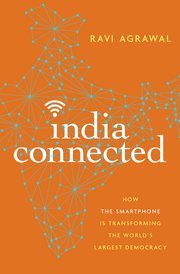Ravi Agrawal (who I’ve known since he was an undergraduate at Harvard) served as CNN’s bureau chief in New Delhi from 2014 to 2017. Before that he was the senior producer of Fareed Zakaria’s television show GPS. And he has recently started a new job as Managing Editor of the influential American magazine Foreign Policy.
Ravi is also a gifted writer and his first book is to be published later this year. It is a remarkable work of non-fiction—India Connected: How the Smartphone is Transforming the World’s Largest Democracy (forthcoming 2018, Oxford University Press).
India Connected is a fascinating – and very well-written – account of the ways in which the smartphone is transforming every aspect of Indian life, from marriage to politics, and not always for the better. During his tenure as CNN’s bureau chief in New Delhi, Ravi traveled a great deal. It comes as no surprise then that his is a working journalist’s book, with extensive reportage from far-flung corners of the country.
In the very first chapter, in a village in Rajasthan, Ravi discovers that an illiterate woman can use the internet by speaking to her smartphone and asking it to play a video of the Taj Mahal. This, of course, would not have been possible without the advent of mobile technology. But that flash of optimism is immediately tempered by a dispatch from a village in Gujarat where the smartphone is banned for young girls.
The book features portraits of many memorable individuals, some unknown and some very famous (like the porn star Sunny Leone). Ravi is careful to avoid big pronouncements, but it is evident from his narrative that the transformations that are being effected by the smartphone contain as many – or more – dystopic possibilities than otherwise.

He cites research in the U.S. showing a correlation between smartphone use and increased rates of depression in teenagers.
Quoting Dr. Manoj Kumar Sharma of the National Institute of Medical Health and Neuro Sciences, Ravi writes: ‘Dr Sharma believes India is heading toward a catastrophe unless a major awareness campaign is initiated. “We have to make sure people understand how addictive technology is, and what it can do to our brains. We don’t even know the extent of the implications right now, because things are changing so quickly here. If we don’t stop to think about this, who knows what could happen?’
In many ways India’s experience with a national digital identification system (the Aadhaar card) is a harbinger of what hi-tech portends for India. The card was, no doubt, conceived of with the best of intentions. But several instances of data leaks have now been widely reported in the press. As the activist Nikhil Pahwa notes: ‘People in tech just foolishly assume that the government is going to do the right thing … But the one thing you know about the Indian government is incompetence. We’re only just realizing how much of a mess we have created here in India.’
India Connected is a must-read for everyone who is interested in contemporary India.



To some extent it is the “educated middle class” in India that is getting left behind in the smart-phone utilisation race. That’s my observation and it’s more than anecdotal.